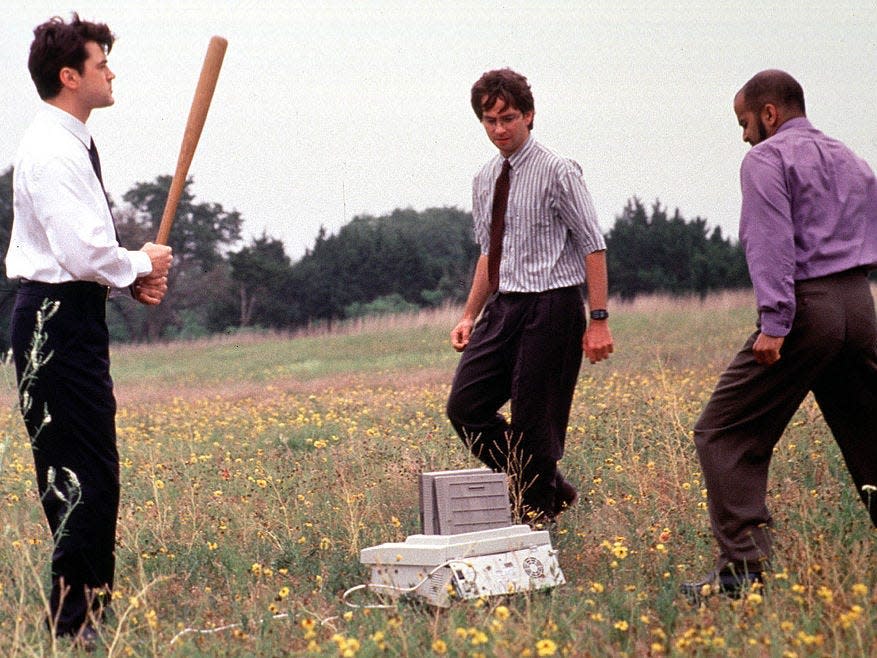The notion of 'fake work' or coasting in the tech industry has a long history, but experts say it's just an 'excuse for bad management'

PayPal Mafia's Keith Rabois accused thousands of Meta and Google workers of doing "fake work" earlier this month.
Tech workers have been accused of "coasting," as well as "resting and vesting" in the past.
Experts said the notion of fake work is part of a larger issue in the industry and often an excuse.
Over the past month, some Silicon Valley executives and founders have pointed fingers at tech workers amid mass layoffs, accusing employees of doing what they've dubbed "fake work."
While the concept has been floated as a consequence of the hiring boom during the pandemic, the rhetoric has a storied history in the tech industry.
People have long accused tech workers of failing to pull their weight — they've just had different names for it over the years. In the past, its been called "rest and vest" or "coasting," which refers to when an employee has an easy workload and spends their time collecting pay and stock while working on pet projects or networking.
The difference is that while the concept formerly applied to only small groups of workers — individuals kept on for their intellectual property or because it would be too expensive to fire them, for example — now executives are accusing thousands of workers of the practice.
These claims are shedding light on larger management issues and internal problems within major tech companies, experts told Insider.
The 'long legacy' of fake work
In 2016, HBO's "Silicon Valley" poked fun at the concept of fake work when one of the show's character's was promoted at a Google-inspired company called Hooli, but unassigned to a project. The character joined a group of other unassigned employees who spent their days on the company roof, essentially twiddling their thumbs and waiting for their contracts to expire.
At the time, Silicon Valley workers told Insider's Julie Bort that the story wasn't so far-fetched: "You get paid so much after a certain level at Google, that once you get there, there's no real reason to work that hard. Life is good, you maximize your vacation. I'll come in when I want to," one engineer said.

According to Scott Latham, a strategic management professor at the University of Massachusetts Lowell who worked in the tech industry during the start of the internet boom, fake work has a "long legacy" in tech.
"One of the reasons Silicon Valley became so dominant over the East coast area was that [the East coast companies] had gotten so bloated they created 'fake work,' but the term back then was 'pet projects,'" Latham said. "It was the idea that you have to give employees runway to experiment and innovate."
The concept bucks tradition in tech, where the expectation for workers has been long hours and complete dedication to the job — from reports of workers sleeping in the office to spending their every waking hours at the elaborate tech campuses.
And while some experts say a certain level of "fake work" is a natural part of the boom-and-bust cycle in tech, not all agree.
Eric Nitzberg, a CEO coach who has worked with hundreds of leaders in tech, said the issue of fake work has never come up in his conversations with executives.
"I don't think it corresponds to the reality of workers on the ground," Nitzberg said. "Certainly there is some variability in the intensity with which people work. There's a handful of people that can work 40 hours a week and manage to do fairly well, but that is the minority. For the most part, these workers are working really hard."
Fake work as an 'excuse for bad management'
Some experts say the idea stems from a larger disconnect between executives and their staff, as well as an uptick in productivity paranoia in the age of remote work.
"Work was once equated with physical exertion," Harvard business professor Rosabeth Moss Kanter said. "But, today, work can be exercising the brain – thinking – which is less observable," she added.
Some workers have accused major tech companies of attempting to hoard talent — a strategy former Baxter CEO Harry Kraemer, a professor of management at Northwestern University, said "makes no economic sense" given the sheer amount of workers in the industry.
Still, there may be some benefit to companies with larger benches as productivity in companies ebbs and flows, some experts said. Latham of the University of Massachusetts Lowell said temporarily placing an employee on the bench between projects can help curb the high cost of hiring and training new staff.

"The bench is meant to keep good workers engaged and in the company," Latham said. "Managers in high tech have struggled with this for over a decade: 'How do I find the right people? How do I keep them in the organization?'"
However, Latham said the practice can also be easily abused. In the case of Meta and Google, it's a symptom of bloat — the company grew too quickly and the employees on the bench will be the first to go in a market downturn, he said.
"I think these 'fake work' people are just people who haven't been properly managed," Latham said. "I would put the blame squarely on the managers, not the workers. Most workers want to come to work. They want to show up and give a fair eight hours of work. Their identity is tied up in the work they do."
Ultimately, Kraemer says executives are pointing fingers at employees as "an excuse for bad management" and "poor planning."
"It's easier to blame company missteps on shirking workers than on executive failures," Kanter, the Harvard professor, added.
Read the original article on Business Insider

 Yahoo Autos
Yahoo Autos 